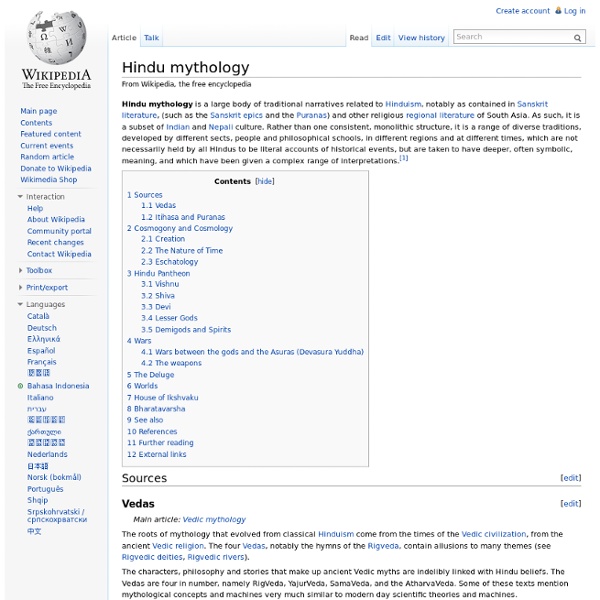Islamic mythology
Islamic mythology is the body of traditional narratives associated with Islam from a mythographical perspective. Many Muslims regard these narratives as historical and sacred and believe they contain profound truths. These traditional narratives include, but are not limited to, the stories contained in the Qur'an. Followers of Islam (Muslims) believe that Islam, in its current form, was established by God, through the prophet Muhammed, who lived in the 6th and 7th centuries CE.[1] Muslims believe that all true prophets (including Musa and Isa) preached Islamic principles that were applicable in their time but when the times changed and people needed new guidance for new situations, God appointed a new prophet with a new code of life that could guide them. Muhammad is the most recent and final prophet, who restored and completed the principles of Islam.[2] Central Islam stories[edit] Life of Muhammad[edit] The Kaaba[edit] Connection with Jewish and Christian mythologies[edit] See also[edit]
Jewish mythology
Jewish mythology is the sacred and traditional narratives that help explain and symbolize Judaism. Elements of Jewish mythology have had a profound influence on Christian and Islamic mythology, as well as world culture in general. Christian mythology directly inherited many of the narratives from the Jewish people, sharing in common the narratives from the Old Testament. Islamic mythology also shares many of the same stories; for instance, a creation account spaced out over six periods, the legend of Abraham, the stories of Moses and the Israelites, and many more. Tanakh[edit] Jewish mythology contains similarities to the myths of other Middle Eastern cultures. The Biblical prophets, including Isaiah, Ezekiel, and Jeremiah, had a concept of the divine that differed significantly from that of the nature religions. "the sun, moon, stars, sky and earth are not gods in their own right, hostile to Yahweh. Zoroastrian influence[edit] R. Linear history[edit] Genesis creation narrative[edit]
Buddhist mythology
Wrathful deities[edit] One notable feature of Tibetan Buddhism and other Vajrayana traditions in particular is the use of Wrathful deities.[2] While the deities have a hideous and ferocious appearance,[3] they are not personifications of evil or demonic forces.[2] The ferocious appearance of these deities is used to instill fear in evil spirits which threaten the Dharma.[3] Wrathful deities are used in worship and devotion[2] with the practice dating to the 8th century[2] having been instituted by Padmasambhava.[2] The origin of these deities comes from mythology in Hinduism, Bon, or other folk deities.[2] Yaksha[edit] The Yaksha are a broad class of nature-spirits, usually benevolent, who are caretakers of the natural treasures hidden in the earth and tree roots.[4] Having been worshiped in India since before the Vedic period,[5] their worship was adopted by both Buddhism and Jainism.[5] Yidam[edit] The Yidam, or Ishta-devata, is a personal meditation deity. Hells[edit] Heavens[edit]
Ascended master
Both "Mahatmas" and "Ascended Master" are terms used in the Ascended Master Teachings. Ascended Master is based on the Theosophical concept of the Mahatma or Master of the Ancient Wisdom. However, "Mahatmas" and "Ascended Masters" are believed by some to differ in certain respects. The Ascended Master Teachings refer to the Sixth Initiation as Ascension.[1] According to the Ascended Master Teachings, a "Master" (or "Spiritual Master") is a human being who has taken the Fifth Initiation and is thereby capable of dwelling on the 5th dimension. A "Chohan" (Lord) of a "Ray" is an Ascended Master who has been placed in charge of one of the 12 "Rays" (until recently, 7 Rays were generally known, and 5 Rays were "secret"), due to having an extraordinary natural spiritual affinity for that Ray. Those who have taken the Seventh Initiation hold the Senior Administrative Posts in the Great White Brotherhood on Earth. Definition[edit] Beliefs about Ascended Masters[edit] New Age Rays Origins[edit]



